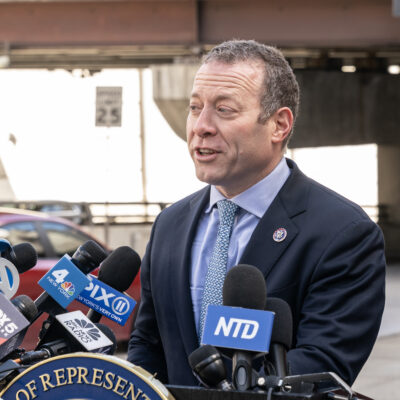Biden should seek congressional war powers for Iran proxy campaign, Cardin says
The Senate Foreign Relations Committee chairman said doesn’t expect that the administration will actually come to Congress for authorities to continue its strikes

Kevin Dietsch/Getty Images
Sen. Ben Cardin (D-MD)
Sen. Ben Cardin (D-MD), the chair of the Senate Foreign Relations Committee, said Thursday that the administration should ask Congress to authorize military force for its ongoing campaign against the Houthis and other Iranian proxy groups in the Middle East — but said it’s likely that won’t happen.
The administration has thus far cited executive authorities, including constitutional self-defense authorities, for its ongoing strikes against Iranian proxies in Yemen and elsewhere. But Cardin told reporters on Thursday that since the current operations appear likely to extend for some time — potentially testing the executive’s time-limited unilateral war powers — the administration should come to Congress.
“It seems to me this is a more permanent challenge,” Cardin said. “The administration would be in a stronger legal position, and stronger international position, if we could get an [Authorization for Use of Military Force] agreed to between Congress and the administration.”
“I see no willingness from any executive branch people” to seek such authorization, Cardin continued. It would likely be highly difficult and time consuming to hammer out a consensus authorization of military force that could pass the current Congress.
The senator also argued that the post-9/11 2001 AUMF, which has been cited by various administrations for counterterrorism activities in the Middle East no longer holds any legal authority.
Lawmakers were working last year on efforts to repeal and replace the 2001 and 2002 Iraq war authorizations, an effort Caridn said would now likely be more difficult because of disputes over whether the 2001 version could be utilized to authorize the current campaign.
The Senate Foreign Relations Committee chair expressed approval for the administration’s decision to place sanctions on Israeli settlers involved in violence in the West Bank. He revealed that he has been pushing the administration behind the scenes for action on this issue, calling both for sanctions on non-citizens and prosecutions of U.S. citizens involved in such activity.
Cardin said he’s not concerned about the now five-day delay in the administration’s military response to an Iranian proxy group’s killing of three U.S. service members in Jordan last weekend, describing the “uncertainty” as a strategic advantage for the U.S. He said he supports a “strong response,” but one that “does not lead to escalation.”
Cardin’s Republican counterpart, Sen. Jim Risch (R-ID), blasted the delay, saying on Thursday that the administration is “telegraphing” the U.S. response — details of which have been reported in the media — and “allowed those Iranians responsible for American deaths to evade strikes.”
Cardin also said that he has discussed with Arab leaders in recent days that bringing the conflict in Gaza to an end could stave off future Iranian proxy attacks in the region.
“Real progress made in Gaza” would “reduce the likelihood that the proxies are going to be active,” Cardin said, explaining, “perhaps in the short term, the easiest way to reduce the tension with the Houthis is we can resolve the issue in Gaza.”
Amid growing pressure from inside and outside Congress to increase pressure on the Iranian regime following the proxy attacks, Cardin told Jewish Insider he’s working with colleagues and the administration to develop legislation to counter the regime including strengthening sanctions.
“I want to send a clear message: we will be taking up legislation that will impose the strongest message and action against Iran’s nefarious activities as we can,” Cardin said.
But he indicated that he favors putting together a new, bipartisan Iran sanctions package, rather than picking up sanctions bills that have already passed through the House.
He also praised the administration’s decision to pause aid to the U.N. Relief and Works Agency pending a “full investigation and accountability.” He added that the issues with UNRWA are “more widespread” than the 12 employees who were allegedly involved in Oct. 7.
But he also pushed back on calls from some lawmakers to permanently defund and replace UNRWA because “there is no substitute at this particular moment” with the same “capacity” that UNRWA has.
“In the short term, we need to utilize that network that’s there,” he told JI. But he said that the question of whether UNRWA should be phased out should be part of longer-term discussions about a new governing authority in Gaza.
Cardin, like other Senate colleagues, drew a direct link between broader regional normalization and post-war progress toward a two-state solution, explaining that there are “opportunities here with the desire of normalization,” particularly from Saudi Arabia, based on his conversations with Arab leaders.
“But first, Hamas has to be neutralized as… an influence in Gaza,” he said. “And secondly, there has to be acknowledgement of a pathway towards two states living side by side in peace.”
He emphasized that a “more permanent way of solving the Palestinian issue,” with a Palestinian government that recognizes Israel and does not pose a threat to its security, is the only way to head off a repeat of Oct. 7.










